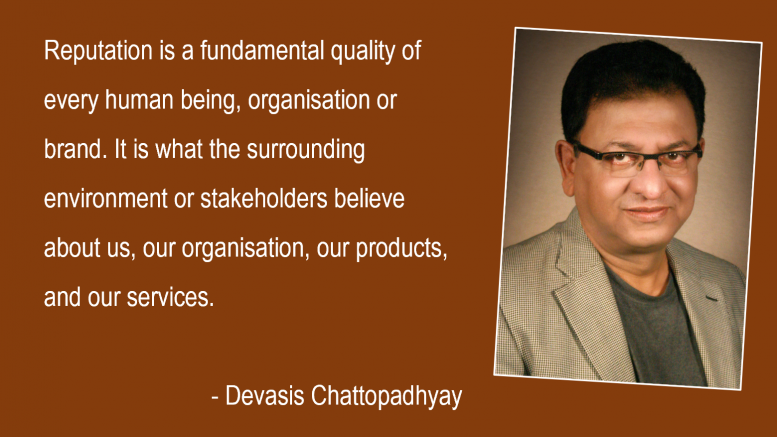Our customers, employees, investors, vendors and associates, in effect all stakeholders, are always talking about us and those discussions impact our reputation. But are we listening?
A good reputation points to a healthy brand, which means that we are trustworthy and provide a stellar stakeholder experience. But what about a negative reputation? It leads to growth stagnation, revenue loss, employee and investor dissatisfaction, stock price erosion and market share decline.
Of course, various sophisticated processes are available today to measure our corporate and brand reputation performances. Still, the following six rules are cardinal must-follow rules for a healthy reputation. I practice them.
We do not have to be more innovative. We need to be disciplined in our approach and we will have a sparkling reputation!
There is a saying in Chinese that – if you do not manage your reputation, your neighbour will manage it for you. No matter how hard the company tries to market its products and services, most customers, like before and more frequently today in a connected world, will look up the reputation of our business before making a purchase decision. Our reputation is critical since it not only attracts customers but also keeps them coming back to us repeatedly to solicit our products and services, or not.
And before addressing the issue. Let us understand what makes our reputation or breaks it.
Reputation is a fundamental quality of every human being, organisation, or brand. It is what the surrounding environment or stakeholders believe about us, our organisation, our products and our services. And expect from us and say about us to others. I will tend to say that reputation results from what we do, what we say and what others say about us.
We do not have to be super-human to manage our reputation or our brands. We need to do the six following things diligently and sincerely:
Six easy rules:
- We should practice what we preach.
- We must be very responsive to our surroundings and stakeholders. We should treat them like we want them to treat us.
- Listen to them more than we talk.
- We should not lie. Lying and getting caught is too much of a reputation risk that we do not want to take. We should not promise something we cannot perform or deliver. If we are criticised, we need not overreact, but we need to respond professionally. We must accept responsibility and take steps to correct the situation if there is a legitimate grievance. It is amazing how humanising a humble response to criticism can improve our reputation.
- We need to be agile. In this connective world of social media, we cannot afford to be laid back. What we have on our -‘To Do’ list for today, we need to complete now.
- Evaluate every action and the reactions we have received because of it. And think through and strategise. And act accordingly.
Warren Buffett famously said, ‘It takes 20 years to build a reputation and five minutes to ruin it. If you think about that, you’ll do things differently’. ‘Communications’ is not rocket science but to apply our common-sense.
The views and opinions published here belong to the author and do not necessarily reflect the views and opinions of the publisher.



Be the first to comment on "How do we manage our Corporate and Brand reputation? Six easy rules, that I follow"